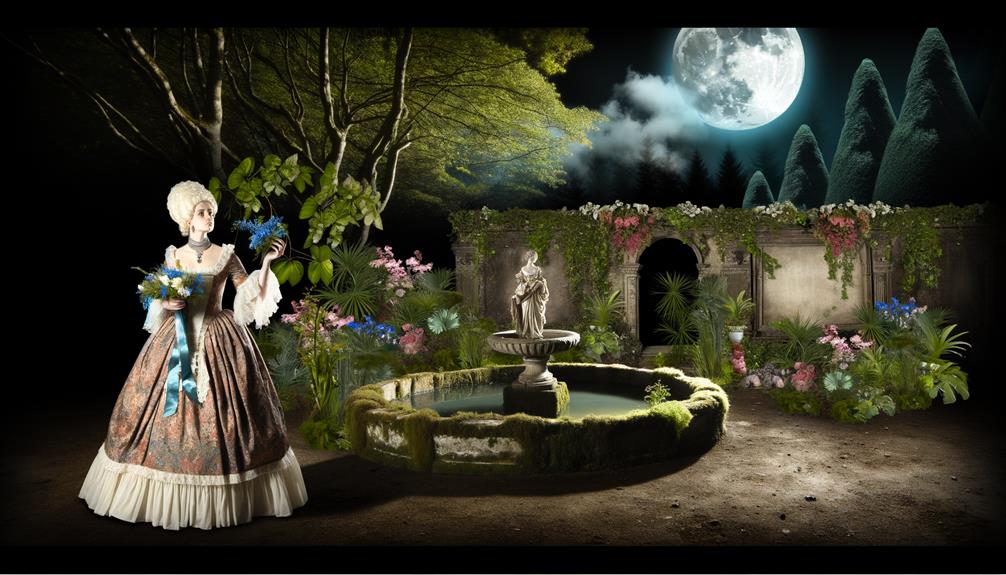Lenore Name Meaning and Origin
The name Lenore, derived from the Greek name Helen, signifies 'light' or 'torch' and is associated with illumination, purity, and hope. It traces its roots to ancient Greek civilization and has evolved through forms like Eleonore and Leonore.
Popularized in English-speaking countries during the 18th and 19th centuries, Lenore also holds literary significance, appearing prominently in Edgar Allan Poe's works to symbolize lost love and melancholic beauty. This name has left its mark in various cultural spheres, inspiring numerous artistic expressions and noteworthy figures.
Discover the full extent of Lenore's historical and cultural journey.

Key Takeaways
- Lenore is derived from the Greek name Helen, meaning 'light' or 'torch'.
- The name symbolizes illumination, enlightenment, guidance, purity, and hope.
- It has historical roots in ancient Greek civilization and evolved through European forms like Eleonore.
- Lenore gained literary significance through Edgar Allan Poe's poems, symbolizing lost love and mourning.
- The name has cultural impact, immortalized in literature and associated with ethereal qualities.
Meaning of Lenore
The name Lenore, often seen as a poetic and literary variant, is derived from the Greek name Helen, which means 'light' or 'torch.' This etymological origin suggests associations with illumination and enlightenment, qualities that have been venerated across various cultures and epochs.
The name Lenore gained prominence through its use in literature, where it often embodies an ethereal or idealized presence. Its connotation of light signifies guidance, purity, and hope, traits that resonate deeply in literary and cultural contexts.
The evolution of Lenore from Helen underscores a nuanced transformation, reflecting its adaptation and enduring appeal in various linguistic landscapes. Consequently, Lenore encapsulates a rich tapestry of meanings, intertwining classical roots with its unique literary charm.
Historical Roots
Tracing its historical roots, the name Lenore can be linked back to ancient Greek civilization through its derivation from Helen, a name that has permeated Western literary and cultural traditions for centuries. Helen, often associated with Helen of Troy from Homer's 'Iliad,' symbolizes beauty and noble lineage.
Over time, the name evolved, appearing in various forms throughout European history, particularly in Germany and France, where it became Eleonore or Leonore. The Anglicized version, Lenore, emerged prominently in English-speaking countries during the 18th and 19th centuries.
This progression illustrates not only the name's adaptability but also its enduring appeal across different cultures and epochs, showcasing its deep-rooted historical significance and linguistic transformations.
Literary Significance
The name Lenore holds significant literary significance, especially through Edgar Allan Poe's poems 'The Raven' and 'Lenore,' where it symbolizes lost love and mourning.
This name has been used extensively in poetry and literature to evoke themes of beauty, melancholy, and the ephemeral nature of life.
Such symbolic usage highlights Lenore's enduring impact on literary traditions and its poignant resonance in cultural narratives.
Edgar Allan Poe's Influence
In examining the literary significance of the name Lenore, Edgar Allan Poe's haunting poem 'Lenore' stands as a pivotal work that underscores its melancholic and ethereal connotations. Poe's influence on the name Lenore can be observed through several key elements:
- Historical Context:
Written in 1843, 'Lenore' reflects the 19th-century fascination with death and the afterlife, mirroring the period's literary and cultural preoccupations.
- Characterization:
Lenore is depicted as a lost, idealized figure, symbolizing purity and unattainable beauty, resonating with readers' emotions.
- Poe's Stylistic Impact:
His use of rhythmic structure and somber tone in 'Lenore' has solidified the name's association with themes of lamentation and remembrance in literary circles.
Poe's contribution has thereby indelibly marked the name Lenore in literary history.
Symbolism in Poetry
Exploring the rich tapestry of symbolism in poetry reveals how names like Lenore transcend their literal meanings to embody broader themes of love, loss, and memory.
Historically, poets have employed names to evoke specific emotions and universal human experiences. Lenore, for example, often symbolizes purity, lost love, and the haunting nature of remembrance. This usage is rooted in the Romantic era, where the idealization of women and the exploration of deep emotional states were prevalent.
Such symbolic names serve as vessels for conveying complex sentiments, allowing readers to connect with the narrative on a profound level. Consequently, the name Lenore becomes more than a mere identifier; it transforms into a poignant symbol resonating through poetic works.
Lenore in Literature
Renowned for its melancholic resonance, the name Lenore holds significant literary weight, particularly in Edgar Allan Poe's evocative poem 'The Raven,' where it epitomizes the themes of eternal mourning and unattainable beauty.
The character of Lenore serves as a haunting symbol of lost love, intensifying the poem's somber atmosphere. Poe's use of Lenore is not arbitrary; it reflects a broader Romantic tradition that associates the name with ethereal and tragic beauty.
Key literary points include:
- Symbol of Lost Love: In 'The Raven,' Lenore represents the narrator's deep sorrow and unending grief.
- Romantic Ideal: The name resonates with 19th-century Romanticism, embodying idealized beauty and poignant loss.
- Cultural Impact: Lenore's association with themes of death and beauty has influenced subsequent literature and popular culture.
Cultural Impact
Throughout literary history, the name Lenore has been immortalized by Edgar Allan Poe's haunting poem 'Lenore' and his famous work 'The Raven,' cementing its place in the cultural imagination. Poe's usage of Lenore evokes themes of lost love and melancholic beauty, resonating deeply in the collective consciousness.
Beyond Poe, the name frequently appears in various artistic expressions, including operas, novels, and contemporary media, often symbolizing purity and ethereal qualities. In folklore, Lenore is sometimes linked to the German ballad 'Lenore' by Gottfried August Bürger, further enriching its narrative depth.
This enduring cultural presence underscores the name's evocative power and its ability to inspire a wide array of emotional and artistic responses across different historical periods.
Famous Namesakes
Among the notable individuals bearing the name Lenore, Lenore Kandel stands out as a prominent figure in the Beat Generation, known for her groundbreaking poetry that challenged societal norms in the 1960s. Kandel's work, particularly her controversial poem 'The Love Book,' became a symbol of the era's countercultural movement.
Other significant namesakes include:
- Lenore Ulric – An influential American stage and film actress in the early 20th century, known for her vibrant performances in Broadway productions.
- Lenore Tawney – A pioneering figure in the fiber art movement, whose innovative weaving techniques redefined textile art in the mid-20th century.
- Lenore Romney – A notable political figure and mother of Mitt Romney, who played a significant role in American politics during the 1960s and 1970s.
Popularity Trends
The name Lenore has experienced varying degrees of popularity over the decades, influenced by cultural, literary, and historical factors. In the 19th century, Edgar Allan Poe's poem 'The Raven' significantly boosted its recognition.
However, its usage began to wane in the early 20th century. The name saw a resurgence during the mid-20th century, aligning with a broader revival of classical and literary names.
According to Social Security Administration data, Lenore peaked in popularity in the 1920s and 1930s but has since seen a gradual decline. Despite its fluctuating trend, it remains a cherished choice for parents seeking a name with lyrical and historical resonance.
Today, Lenore is considered a classic, albeit less common, option.
Conclusion
Lenore, a name imbued with historical depth, literary resonance, and cultural significance, epitomizes an enduring legacy. Stemming from the Greek for 'light,' its roots intertwine with famous literary works and influential figures, reflecting a rich tapestry of historical and cultural narratives.
The name's fluctuating popularity mirrors societal trends, underscoring its timeless allure. Analyzing Lenore reveals a name that, like a well-worn tapestry, retains its beauty and significance through the shifting sands of time.






